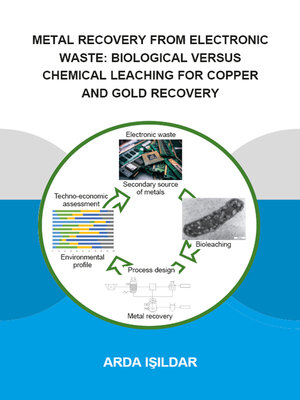Metal Recovery from Electronic Waste
ebook ∣ Biological Versus Chemical Leaching for Recovery of Copper and Gold · IHE Delft PhD Thesis Series
By Arda Işildar

Sign up to save your library
With an OverDrive account, you can save your favorite libraries for at-a-glance information about availability. Find out more about OverDrive accounts.
Find this title in Libby, the library reading app by OverDrive.



Search for a digital library with this title
Title found at these libraries:
| Library Name | Distance |
|---|---|
| Loading... |
Waste electrical and electronic equipment (WEEE) generation is a global problem. Despite the growing awareness and deterring legislation, most of the WEEE is disposed improperly, i.e. landfilled or otherwise shipped overseas, and treated in sub-standard conditions. Informal recycling of WEEE has catastrophic effects on humans and the environment. WEEE contains considerable quantities of valuable metals such as base metals, precious metals and rare earth elements (REE). Metal recovery from WEEE is conventionally carried out by pyrometallurgical and hydrometallurgical methods.
In this PhD research, novel metal recovery technologies from WEEE are investigated. Using acidophilic and cyanide-generating bacteria, copper and gold were removed from crushed electronic waste with removal efficiencies of 98.4 and 44.0%, respectively. The leached metals in solution were recovered using sulfidic precipitation and electrowinning separation techniques. Finally, a techno-economic assessment of the technology was studied. This research addresses the knowledge gap on two metal extraction approaches, namely chemical and biological, from a secondary source of metals. The essential parameters of the selective metal recovery processes, scale-up potential, techno-economic and sustainability assessment have been studied.







